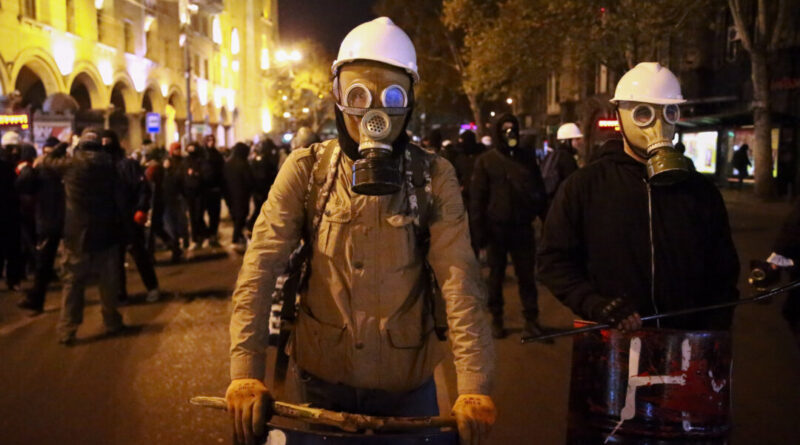Georgian Officials Blame Anti-Government Demonstrators for Inciting Violence
Demonstrators allege that Georgia’s ruling party is engaging in authoritarian and pro-Russian policies.
Georgian authorities have accused anti-government protesters in Tbilisi, the capital of the South Caucasus nation, of inciting violence following nine days of street demonstrations.
Reports from local media state that on Dec. 6, the interior ministry announced that police had apprehended five individuals suspected of planning violent activities in Tbilisi and other areas.
The ministry also reported seizing illegal firearms during searches of the suspects’ homes and detaining thirteen others for inciting violent behavior.
These claims come after a series of protests erupted over the government’s decision to halt Georgia’s entry into the European Union.
Protesters are critical of the ruling party, accusing the Georgian Dream of prioritizing relations with Russia over EU membership and adopting authoritarian and pro-Russian policies.
Relations between Tbilisi and Moscow have been strained since a brief conflict in 2008 over the breakaway territories of Abkhazia and South Ossetia.
Opponents of the ruling party also contest the results of the October election, where Georgian Dream purportedly won 54% of the vote, according to the country’s electoral commission.
The demonstrations have turned violent in recent days, with law enforcement using tear gas and water cannons to disperse crowds.
Since the protests began, hundreds of demonstrators have been arrested, and over 100 individuals, including police officers, have reportedly sustained injuries.
Georgian officials blame the protesters for escalating violence, stating that it is orchestrated by them.
In a recent statement, Mamuka Mdinaradze, executive secretary of Georgian Dream, alleged that the demonstrators initiated and maintained the systemic violence.
In addition, several opposition figures in Georgia have been apprehended by police for their involvement in the protests.
For example, Nika Gvaramia, leader of the Coalition for Change party, was detained after a police raid on the party’s headquarters in Tbilisi on Dec. 4.
‘Undemocratic Practices’
Protests have been ongoing in Tbilisi since the summer, sparked by a law passed by parliament requiring organizations to register with the government if more than 20% of their funding comes from foreign sources.
Supporters argue that the law aims to protect Georgia from external influences disguised as civil society and NGOs. Critics claim it suppresses free speech, drawing comparisons to Russian legislation used to curb dissent.
The enactment of the law in May drew condemnation from Washington and Brussels, accusing Tbilisi of undemocratic conduct.
Subsequently, the U.S. imposed restrictions on Georgian officials, and the EU threatened to revoke Georgia’s candidate status unless changes were made.
Before the election, the EU’s envoy to Tbilisi hinted at potential sanctions if electoral irregularities occurred.
The ruling party retaliated by accusing the West of coercion and meddling in Georgia’s internal affairs.
The Dutch Foreign Minister expressed intentions to urge the EU to suspend visa-free travel for Georgia to signal disapproval of the current direction the country is taking.
‘Color Revolution’ Claims
Some insist that current protests in Georgia are receiving clandestine support from Western entities due to the EU’s pronounced opposition to Georgian Dream.
Prime Minister Irakli Kobakhidze criticized what he termed as foreign-funded attempts to destabilize the country.
He likened the ongoing demonstrations in Georgia to Ukraine’s 2014 Maidan Revolution, which resulted in the removal of Ukraine’s Russia-friendly president from power.
Several officials in Georgia and Russia view the Ukrainian revolution in 2014 as a U.S.-backed “coup” against a legitimately elected leader.
While Washington refutes this claim, citing democratic ideals, a Kremlin spokesperson appeared to agree with Kobakhidze, suggesting that the protests in Tbilisi mirror a potential “color revolution.”
“We have observed similar events in various countries,” the spokesperson said, drawing parallels to the Maidan uprising in Ukraine.
Reuters contributed to this report.



